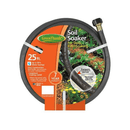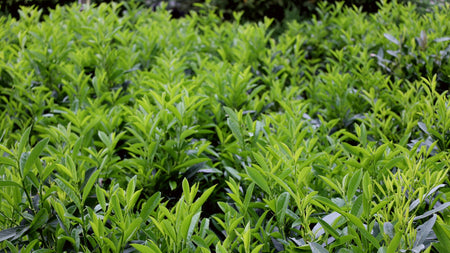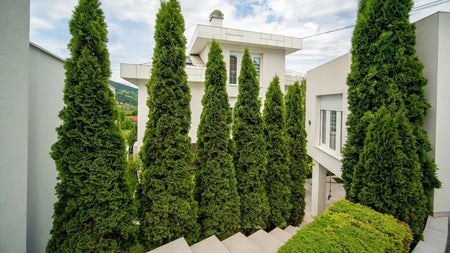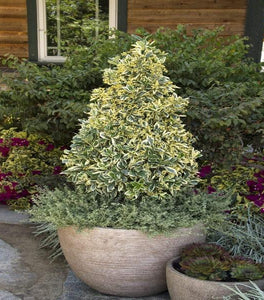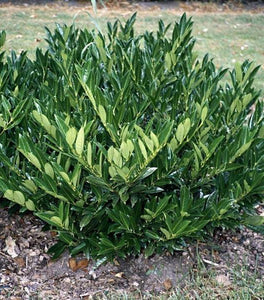
Images Depict Mature Plants
Prunus laurocerasus ‘Nana’ – Dwarf English Laurel for Low Evergreen Hedges
Compact evergreen elegance for low hedges and borders.
Prunus laurocerasus ‘Nana’, commonly known as Dwarf English Laurel Nana or Compact Cherry Laurel, is prized for its neat, evergreen foliage and naturally low growth habit. Reaching approximately 2–3 feet tall and 3–4 feet wide, it forms a dense, glossy green hedge that is ideal for knot gardens, foundation plantings, and formal borders. Its classic look and manageable size make it a favorite for both traditional and modern landscapes.
Fragrant spring blooms and year-round color.
In late spring, this shade-tolerant evergreen shrub produces fragrant white flower spikes that attract bees and butterflies, adding seasonal charm. Even when not in bloom, the rich, dark green leaves provide year-round texture and color, giving your garden a four-season appeal. This deer-resistant dwarf laurel stays attractive without constant upkeep.
Low-maintenance and adaptable.
Hardy in USDA Zones 6–9, Prunus laurocerasus ‘Nana’ thrives in full sun to full shade and adapts to a wide range of soils as long as drainage is good. Its slow-to-moderate growth rate means it needs only occasional light pruning to maintain a formal shape, making it perfect for low hedges, shaded gardens, and small-space landscapes.
A timeless, dependable evergreen hedge choice.
Whether edging a walkway, framing a patio, or creating a low privacy screen, this compact cherry laurel provides year-round structure, fragrant spring flowers, and reliable deer resistance. Dwarf English Laurel ‘Nana’ is a low-maintenance evergreen solution that delivers classic garden style for decades.
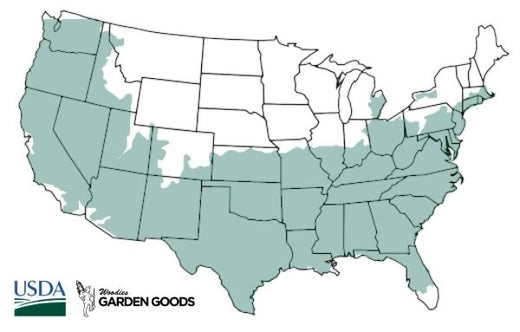
| Hardiness Zone: | 6-9 |
|---|---|
| Mature Height: | 2 to 3 feet |
| Mature Width: | 3 to 4 feet |
| Classification: | Broad leaved evergreen shrub |
| Sunlight: | Full sun to part shade |
| Habit: | Densely branched, spreading |
| Foliage: | Dark green evergreen leaves |
| Flower Color: | White fragrant flowers that produce black fruit |
| Pruning Season: | Prune in spring after flowering |
| Soil Condition: | Any well drained soil |
| Water Requirements: | Water well until established |
| Uses: | Extremely attractive when used as in the mixed border, foundations, or planted in mass. Works well as a hedge |
How to Care for Dwarf English Laurel
Once you buy a Dwarf English Laurel 'nana', make sure to read about the care instructions that are recommended to keep this plant healthy and thriving.
How do I plant Prunus laurocerasus ‘Nana’ for a low evergreen hedge?
Choose a site with full sun to full shade and well-drained soil. Dig holes twice as wide as the root ball and space plants 3–4 feet apart for a dense hedge or wider for individual accents. Set the shrub so the top of the root ball is level with the surrounding soil, backfill halfway, water thoroughly to settle, then finish filling and water again. Apply a 2–3 inch layer of mulch, keeping it a few inches away from the trunk. Plant in spring or early fall to give roots time to establish before the heat of summer or winter cold.
How often should I water Dwarf English Laurel ‘Nana’ after planting?
During the first growing season, water deeply once or twice a week, letting the soil dry slightly between waterings. Consistent moisture encourages deep root growth and helps maintain the lush, glossy evergreen foliage. Once established, this drought-tolerant cherry laurel typically needs supplemental water only during extended dry spells. Mulch helps conserve soil moisture and protects roots from temperature extremes.
When and how should I fertilize Prunus laurocerasus ‘Nana’?
Feed in early spring with a balanced, slow-release shrub fertilizer to promote healthy foliage and steady growth. Spread fertilizer evenly around the drip line and water thoroughly to move nutrients into the soil. A single annual feeding is typically sufficient to keep the dense, dark green leaves vibrant and the plant looking neat all season.

Do Dwarf English Laurel ‘Nana’ shrubs require regular pruning?
This variety naturally maintains a compact, rounded shape, so heavy pruning is rarely needed. In late spring or early summer, after the white flower spikes fade, lightly shear or hand-prune to keep the desired size or formal hedge lines. Avoid cutting into old wood, as cherry laurel does not regenerate from bare stems. Occasional light pruning keeps your formal evergreen border or knot garden looking crisp and elegant year-round.






